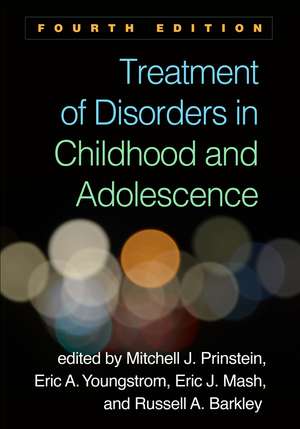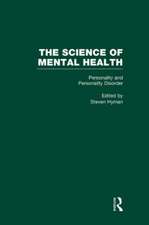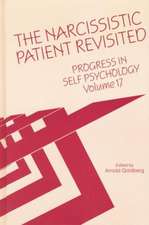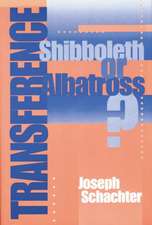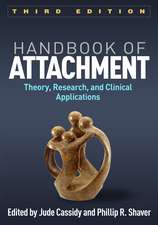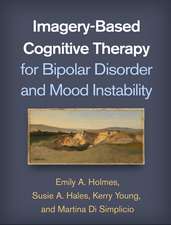Treatment of Disorders in Childhood and Adolescence, Fourth Edition
Editat de Mitchell J. Prinstein, Eric A. Youngstrom, Eric J. Mash, Russell A. Barkleyen Limba Engleză Paperback – 10 iun 2021
Now completely revised (over 90% new), this definitive practitioner reference and course text comprehensively reviews evidence-based treatments for psychological disorders in children and adolescents. The significantly expanded fourth edition covers an increased number of disorders, as well as transdiagnostic issues and public health concerns. Psychosocial, pharmacological, and complementary therapies are identified and described in well-organized chapters that include rich clinical illustrations. Prominent experts address developmental considerations in treatment and offer guidance for tailoring interventions to each child and family's needs. Prior edition title: Treatment of Childhood Disorders, Third Edition, edited by Eric J. Mash and Russell A. Barkley.
New to This Edition
*All chapters are new, reflecting over a decade of clinical and empirical developments.
*Chapters on additional clinical issues: bipolar disorder, suicidal and nonsuicidal self-injury, obsessive–compulsive disorder, infant and toddler problems, posttraumatic stress disorder, coping and emotion regulation, bereavement, early-onset schizophrenia, personality disorders, childhood obesity, and sleep problems.
*Chapters on case conceptualization and evidence-based therapist flexibility.
*Illustrative case examples and transcripts added throughout.
*Updated for DSM-5; every chapter also considers transdiagnostic and dimensional issues.
See also the editors' Assessment of Disorders in Childhood and Adolescence, Fifth Edition.
New to This Edition
*All chapters are new, reflecting over a decade of clinical and empirical developments.
*Chapters on additional clinical issues: bipolar disorder, suicidal and nonsuicidal self-injury, obsessive–compulsive disorder, infant and toddler problems, posttraumatic stress disorder, coping and emotion regulation, bereavement, early-onset schizophrenia, personality disorders, childhood obesity, and sleep problems.
*Chapters on case conceptualization and evidence-based therapist flexibility.
*Illustrative case examples and transcripts added throughout.
*Updated for DSM-5; every chapter also considers transdiagnostic and dimensional issues.
See also the editors' Assessment of Disorders in Childhood and Adolescence, Fifth Edition.
Preț: 441.91 lei
Preț vechi: 549.23 lei
-20% Nou
Puncte Express: 663
Preț estimativ în valută:
84.63€ • 86.36$ • 71.20£
84.63€ • 86.36$ • 71.20£
Comandă specială
Livrare economică 05-19 februarie
Doresc să fiu notificat când acest titlu va fi disponibil:
Se trimite...
Preluare comenzi: 021 569.72.76
Specificații
ISBN-13: 9781462547715
ISBN-10: 1462547710
Pagini: 928
Dimensiuni: 178 x 254 x 46 mm
Greutate: 1.57 kg
Ediția:4 ed
Editura: Guilford Publications
Colecția Guilford Press
ISBN-10: 1462547710
Pagini: 928
Dimensiuni: 178 x 254 x 46 mm
Greutate: 1.57 kg
Ediția:4 ed
Editura: Guilford Publications
Colecția Guilford Press
Public țintă
Postgraduate, Professional, and UndergraduateCuprins
I. General Principles
1. Introduction, Mitchell J. Prinstein & Eric A. Youngstrom
2. Case Conceptualization, Kristel Thomassin & John Hunsley
3. Evidence-Based Therapist Flexibility: Making Treatment Work for Clients, Brian C. Chu
II. Behavior Disorders
4. Attention-Deficit/Hyperactivity Disorder, Steven W. Evans, Julie Sarno Owens, & Thomas J. Power
5. Conduct and Oppositional Disorders, Robert J. McMahon & Paul J. Frick
III. Mood Disorders and Self-Harm
6. Depressive Disorders, John F. Curry & Allison E. Meyer
7. Bipolar Disorder, Mary A. Fristad & Michelle E. Roley-Roberts
8. Suicidal and Nonsuicidal Self-Injury, Matthew K. Nock, Chelsea E. Boccagno, Evan M. Kleiman, Franchesca Ramirez, & Shirley B. Wang
IV. Anxiety and Obsessive–Compulsive Disorders
9. Anxiety Disorders, Sophie A. Palitz, Jordan P. Davis, & Philip C. Kendall
10. Obsessive–Compulsive Disorder, Joshua Kemp & Jennifer B. Freeman
V. Developmental and Cognitive Disorders
11. Common Issues in Infancy and Toddlerhood, Juliana Acosta, Daniel M. Bagner, & Alice S. Carter
12. Autism Spectrum Disorder, Laura Grofer Klinger & Katerina M. Dudley
13. Intellectual Disability, Johnny L. Matson, Maya Matheis, Jasper A. Estabillo, Claire O. Burns, Abigail Issarraras, W. Jason Peters, & Xinrui Jiang
14. Learning Disabilities, Ryan J. McGill & Nadine Ndip
VI. Trauma, Life Events, and Abuse
15. Posttraumatic Stress Disorder, Annette M. La Greca & BreAnne A. Danzi
16. Coping and Emotion Regulation, Bruce E. Compas & Alexandra H. Bettis
17. Persistent Complex Bereavement Disorder, Julie B. Kaplow, Christopher M. Layne, & Robert S. Pynoos
18. Child Maltreatment, Vicky Veitch Wolfe & Brynn M. Kelly
VII. Problems of Adolescence and Emerging Adulthood
19. Substance Use Problems, Tammy Chung & Rachel L. Bachrach
20. Early-Onset Schizophrenia, Aditi Sharma & Jon McClellan
21. Personality Disorders, Francheska Perepletchikova & Donald Nathanson
22. Eating Disorders, James Lock & Lily Osipov
VIII. Health-Related Issues
23. Obesity, Jacqueline F. Hayes, Katherine N. Balantekin, Mackenzie L. Brown, & Denise E. Wilfley
24. Sleep Problems, Danielle M. Graef & Kelly C. Byars
1. Introduction, Mitchell J. Prinstein & Eric A. Youngstrom
2. Case Conceptualization, Kristel Thomassin & John Hunsley
3. Evidence-Based Therapist Flexibility: Making Treatment Work for Clients, Brian C. Chu
II. Behavior Disorders
4. Attention-Deficit/Hyperactivity Disorder, Steven W. Evans, Julie Sarno Owens, & Thomas J. Power
5. Conduct and Oppositional Disorders, Robert J. McMahon & Paul J. Frick
III. Mood Disorders and Self-Harm
6. Depressive Disorders, John F. Curry & Allison E. Meyer
7. Bipolar Disorder, Mary A. Fristad & Michelle E. Roley-Roberts
8. Suicidal and Nonsuicidal Self-Injury, Matthew K. Nock, Chelsea E. Boccagno, Evan M. Kleiman, Franchesca Ramirez, & Shirley B. Wang
IV. Anxiety and Obsessive–Compulsive Disorders
9. Anxiety Disorders, Sophie A. Palitz, Jordan P. Davis, & Philip C. Kendall
10. Obsessive–Compulsive Disorder, Joshua Kemp & Jennifer B. Freeman
V. Developmental and Cognitive Disorders
11. Common Issues in Infancy and Toddlerhood, Juliana Acosta, Daniel M. Bagner, & Alice S. Carter
12. Autism Spectrum Disorder, Laura Grofer Klinger & Katerina M. Dudley
13. Intellectual Disability, Johnny L. Matson, Maya Matheis, Jasper A. Estabillo, Claire O. Burns, Abigail Issarraras, W. Jason Peters, & Xinrui Jiang
14. Learning Disabilities, Ryan J. McGill & Nadine Ndip
VI. Trauma, Life Events, and Abuse
15. Posttraumatic Stress Disorder, Annette M. La Greca & BreAnne A. Danzi
16. Coping and Emotion Regulation, Bruce E. Compas & Alexandra H. Bettis
17. Persistent Complex Bereavement Disorder, Julie B. Kaplow, Christopher M. Layne, & Robert S. Pynoos
18. Child Maltreatment, Vicky Veitch Wolfe & Brynn M. Kelly
VII. Problems of Adolescence and Emerging Adulthood
19. Substance Use Problems, Tammy Chung & Rachel L. Bachrach
20. Early-Onset Schizophrenia, Aditi Sharma & Jon McClellan
21. Personality Disorders, Francheska Perepletchikova & Donald Nathanson
22. Eating Disorders, James Lock & Lily Osipov
VIII. Health-Related Issues
23. Obesity, Jacqueline F. Hayes, Katherine N. Balantekin, Mackenzie L. Brown, & Denise E. Wilfley
24. Sleep Problems, Danielle M. Graef & Kelly C. Byars
Notă biografică
Mitchell J. Prinstein, PhD, ABPP, is the John Van Seters Professor of Psychology and Neuroscience and Director of Clinical Psychology at the University of North Carolina at Chapel Hill. His research examines interpersonal models of internalizing symptoms and health-risk behaviors among adolescents, with a focus on the unique role of peer relationships in the developmental psychopathology of depression, self-injury, and suicidality. Dr. Prinstein is a past editor of the Journal of Clinical Child and Adolescent Psychology and a past president of the Society for a Science of Clinical Psychology and the Society for Clinical Child and Adolescent Psychology. He is a recipient of awards including the Theodore Blau Early Career Award from the Society of Clinical Psychology of the American Psychological Association (APA), the Brickell Memorial Award for research on suicidality from Columbia University, the Mentor Award from the Association for Behavioral and Cognitive Therapies, the Beverly Thorn Award for Outstanding Service from the Council of University Directors of Clinical Psychology, and the Raymond D. Fowler Award for Outstanding Contribution to the Professional Development of Graduate Students from the American Psychological Association of Graduate Students.
Eric A. Youngstrom, PhD, is Professor of Psychology and Neuroscience and Professor of Psychiatry at the University of North Carolina at Chapel Hill, where he is also Acting Director of the Center for Excellence in Research and Treatment of Bipolar Disorder. He was the inaugural recipient of the Early Career Award from the Society of Clinical Child and Adolescent Psychology of the American Psychological Association, and is an elected full member of the American College of Neuropsychopharmacology. Dr. Youngstrom has consulted on DSM-5 and ICD-11. He is past president of the Society for Clinical Child and Adolescent Psychology and currently chairs the Work Group on Child Diagnosis for the International Society for Bipolar Disorders.
Eric J. Mash, PhD, is Professor Emeritus of Psychology at the University of Calgary and Affiliate Professor in the Department of Psychiatry at Oregon Health and Science University. He is a Fellow of the Canadian Psychological Association and of the Society of Clinical Psychology, the Society for Child and Family Policy and Practice, the Society of Clinical Child and Adolescent Psychology, and the Society of Pediatric Psychology of the American Psychological Association. Dr. Mash is also a Fellow and Charter Member of the Association for Psychological Science. He has served as an editor, editorial board member, and editorial consultant for numerous journals and has published widely on child and adolescent psychopathology, assessment, and treatment.
Russell A. Barkley, PhD, ABPP, ABCN, before retiring in 2021, served on the faculties of the University of Massachusetts Medical Center, the Medical University of South Carolina, and Virginia Commonwealth University. Dr. Barkley has worked with children, adolescents, and families since the 1970s and is the author of numerous bestselling books for both professionals and the public, including Taking Charge of ADHD and Your Defiant Child. He has also published six assessment scales and more than 300 scientific articles and book chapters on ADHD, executive functioning, and childhood defiance. A frequent conference presenter and speaker who is widely cited in the national media, Dr. Barkley is past president of the Section on Clinical Child Psychology (the former Division 12) of the American Psychological Association (APA), and of the International Society for Research in Child and Adolescent Psychopathology. He is a recipient of awards from the American Academy of Pediatrics and the APA, among other honors.
Eric A. Youngstrom, PhD, is Professor of Psychology and Neuroscience and Professor of Psychiatry at the University of North Carolina at Chapel Hill, where he is also Acting Director of the Center for Excellence in Research and Treatment of Bipolar Disorder. He was the inaugural recipient of the Early Career Award from the Society of Clinical Child and Adolescent Psychology of the American Psychological Association, and is an elected full member of the American College of Neuropsychopharmacology. Dr. Youngstrom has consulted on DSM-5 and ICD-11. He is past president of the Society for Clinical Child and Adolescent Psychology and currently chairs the Work Group on Child Diagnosis for the International Society for Bipolar Disorders.
Eric J. Mash, PhD, is Professor Emeritus of Psychology at the University of Calgary and Affiliate Professor in the Department of Psychiatry at Oregon Health and Science University. He is a Fellow of the Canadian Psychological Association and of the Society of Clinical Psychology, the Society for Child and Family Policy and Practice, the Society of Clinical Child and Adolescent Psychology, and the Society of Pediatric Psychology of the American Psychological Association. Dr. Mash is also a Fellow and Charter Member of the Association for Psychological Science. He has served as an editor, editorial board member, and editorial consultant for numerous journals and has published widely on child and adolescent psychopathology, assessment, and treatment.
Russell A. Barkley, PhD, ABPP, ABCN, before retiring in 2021, served on the faculties of the University of Massachusetts Medical Center, the Medical University of South Carolina, and Virginia Commonwealth University. Dr. Barkley has worked with children, adolescents, and families since the 1970s and is the author of numerous bestselling books for both professionals and the public, including Taking Charge of ADHD and Your Defiant Child. He has also published six assessment scales and more than 300 scientific articles and book chapters on ADHD, executive functioning, and childhood defiance. A frequent conference presenter and speaker who is widely cited in the national media, Dr. Barkley is past president of the Section on Clinical Child Psychology (the former Division 12) of the American Psychological Association (APA), and of the International Society for Research in Child and Adolescent Psychopathology. He is a recipient of awards from the American Academy of Pediatrics and the APA, among other honors.
Recenzii
"In its fourth edition, this book remains the authoritative, scholarly, foundational volume that is a 'must read' for all child and adolescent mental health trainees, clinicians, and investigators. The editors and contributors, all leaders in their respective areas, ground the reader in the richly sourced science supporting evidence-based treatments. Compelling guides for applying treatment for specific disorders are brought to life through detailed descriptions of the components and course of therapy, and reinforced with engaging clinical case examples. Joined by Prinstein and Youngstrom, Mash and Barkley carry forward their tradition of excellence."--Anne Marie Albano, PhD, ABPP, Department of Psychiatry, Columbia University Medical Center; Director, Columbia University Clinic for Anxiety and Related Disorders
"This fourth edition promises to become a mainstay of graduate instruction for years to come. The text provides a definitive look into the current evidence base of treatments for children and adolescents. Each chapter provides a window into the next steps of treatment research for specific mental health domains, and how this research intersects with emerging transdiagnostic perspectives. Students exposed to this text will come out with a firm understanding of where the field stands and where it ought to proceed."--Andres De Los Reyes, PhD, Department of Psychology, University of Maryland, College Park
"Prinstein, Youngstrom, Mash, and Barkley score big on the fourth edition of this text, which has become the classic in the field over the past 30 years. Eminent scholars weave interesting and intricate descriptions of various clinical problems together with developmentally sensitive, evidence-based treatments. The fourth edition includes discussions of DSM-5, ICD-11, and NIMH’s Research Domain Criteria (RDoC). It will go a long way to bridge the gap between science and practice and to reduce the burden of mental health problems for youth, their families, and our society. Students and mental health professionals from diverse backgrounds will benefit from this stimulating, up-to-date, and comprehensive volume."--Thomas H. Ollendick, PhD, ABPP, University Distinguished Professor, Department of Psychology, Virginia Tech
"This volume is a fresh update on the classic text that I have used for decades, first as a student and then as a professor. The editors have assembled many of the world's leading researchers in child and adolescent intervention, whose contributions have the depth, clarity, and timeliness that have characterized each edition of this work. The book goes beyond a mere description of intervention approaches--it incorporates a strong developmental psychopathology perspective, integrates widely used standards for strength of evidence, and synthesizes symptom-based and RDoC perspectives. It is essential reading for anyone seeking to build expertise in evidence-based treatment for child and adolescent mental health concerns."--Bruce F. Chorpita, PhD, Department of Psychology, University of California, Los Angeles; President, PracticeWise
“The editors have hit an absolute home run with this major update of an already classic handbook. They have assembled a veritable 'who’s who' of leading authorities to present cutting-edge, developmentally tailored, and evidence-based approaches to the treatment of child mental health problems. This terrific fourth edition expands on previous editions to reflect the many groundbreaking advances and critical new areas of study in the field. It retains the very successful structure and accessibility that have been so enthusiastically embraced by students and instructors over the years. For trainees and seasoned clinicians alike, this text is truly indispensable."--Jonathan Comer, PhD, Department of Psychology, Florida International University
“The fourth edition of this text provides comprehensive coverage of evidence-based treatments for children and adolescents. This edition addresses contemporary issues such as transdiagnostic considerations, the RDoC framework, and interdisciplinary perspectives. I applaud the editors and contributors for making the content accessible via sample therapy transcripts, tables highlighting key aspects of therapy, and suggestions for tailoring treatments. I enthusiastically recommend this book for doctoral-level coursework balancing research and application in child and adolescent therapy."--Lindsey L. Cohen, PhD, Distinguished University Professor, Department of Psychology, Georgia State University
"The fourth edition of this excellent, practical work reviews the state of the art of psychosocial treatments for pediatric psychiatric conditions. The text considers developmental and cultural issues, DSM and ICD categorization of disorders, and dimensional psychopathology. It also addresses treatment of conditions that cut across disorders, such as suicidality, abuse, and sleep problems. This is a wonderful reference and teaching tool for all levels of clinicians dedicated to improving the lives of children with mental health disorders."--Boris Birmaher, MD, Endowed Chair in Early Onset Bipolar Disease and Professor of Psychiatry, University of Pittsburgh Medical Center
"The fourth edition continues the excellence that we have come to expect from this text while building in exciting new features. The editors have recruited an all-star team of world-renowned experts to write chapters that highlight the state of the science while staying grounded in the realities of clinical practice. Each chapter features tables detailing treatments with various levels of research support for each disorder, using clear, widely accepted criteria. The addition of sample session transcripts and other clinical material will allow students to more easily envision how these research-supported therapies can be applied in practice. I highly recommend this text for either an introductory graduate therapy course or a more specialized graduate seminar in child interventions."--Amanda Jensen-Doss, PhD, Department of Psychology, University of Miami
-The book is easy to read and contains numerous figures/tables that help to clarify the text and instructive case studies….This is an excellent book written by authors who are experts in the field of child and adolescent psychopathology. This fourth edition has been completely revised with updated information and new topics.--Doody's Review Service, 10/18/2019ƒƒA well-organized and thoughtful textbook. (on the third edition)--Journal of Clinical Psychiatry, 10/26/2007ƒƒ[An] important resource for child clinicians and researchers....The contributors to this volume consistently accomplish the difficult feat of bridging research and practice. (on the second edition)--Journal of Cognitive Psychotherapy, 6/26/2007ƒƒEach chapter offers much useful information and promising methods that evidence relative, if not complete, success for thousands of children and families in need. (on the second edition)--Child and Family Behavior Therapy, 6/22/2007"This fourth edition promises to become a mainstay of graduate instruction for years to come. The text provides a definitive look into the current evidence base of treatments for children and adolescents. Each chapter provides a window into the next steps of treatment research for specific mental health domains, and how this research intersects with emerging transdiagnostic perspectives. Students exposed to this text will come out with a firm understanding of where the field stands and where it ought to proceed."--Andres De Los Reyes, PhD, Department of Psychology, University of Maryland, College Park
"Prinstein, Youngstrom, Mash, and Barkley score big on the fourth edition of this text, which has become the classic in the field over the past 30 years. Eminent scholars weave interesting and intricate descriptions of various clinical problems together with developmentally sensitive, evidence-based treatments. The fourth edition includes discussions of DSM-5, ICD-11, and NIMH’s Research Domain Criteria (RDoC). It will go a long way to bridge the gap between science and practice and to reduce the burden of mental health problems for youth, their families, and our society. Students and mental health professionals from diverse backgrounds will benefit from this stimulating, up-to-date, and comprehensive volume."--Thomas H. Ollendick, PhD, ABPP, University Distinguished Professor, Department of Psychology, Virginia Tech
"This volume is a fresh update on the classic text that I have used for decades, first as a student and then as a professor. The editors have assembled many of the world's leading researchers in child and adolescent intervention, whose contributions have the depth, clarity, and timeliness that have characterized each edition of this work. The book goes beyond a mere description of intervention approaches--it incorporates a strong developmental psychopathology perspective, integrates widely used standards for strength of evidence, and synthesizes symptom-based and RDoC perspectives. It is essential reading for anyone seeking to build expertise in evidence-based treatment for child and adolescent mental health concerns."--Bruce F. Chorpita, PhD, Department of Psychology, University of California, Los Angeles; President, PracticeWise
“The editors have hit an absolute home run with this major update of an already classic handbook. They have assembled a veritable 'who’s who' of leading authorities to present cutting-edge, developmentally tailored, and evidence-based approaches to the treatment of child mental health problems. This terrific fourth edition expands on previous editions to reflect the many groundbreaking advances and critical new areas of study in the field. It retains the very successful structure and accessibility that have been so enthusiastically embraced by students and instructors over the years. For trainees and seasoned clinicians alike, this text is truly indispensable."--Jonathan Comer, PhD, Department of Psychology, Florida International University
“The fourth edition of this text provides comprehensive coverage of evidence-based treatments for children and adolescents. This edition addresses contemporary issues such as transdiagnostic considerations, the RDoC framework, and interdisciplinary perspectives. I applaud the editors and contributors for making the content accessible via sample therapy transcripts, tables highlighting key aspects of therapy, and suggestions for tailoring treatments. I enthusiastically recommend this book for doctoral-level coursework balancing research and application in child and adolescent therapy."--Lindsey L. Cohen, PhD, Distinguished University Professor, Department of Psychology, Georgia State University
"The fourth edition of this excellent, practical work reviews the state of the art of psychosocial treatments for pediatric psychiatric conditions. The text considers developmental and cultural issues, DSM and ICD categorization of disorders, and dimensional psychopathology. It also addresses treatment of conditions that cut across disorders, such as suicidality, abuse, and sleep problems. This is a wonderful reference and teaching tool for all levels of clinicians dedicated to improving the lives of children with mental health disorders."--Boris Birmaher, MD, Endowed Chair in Early Onset Bipolar Disease and Professor of Psychiatry, University of Pittsburgh Medical Center
"The fourth edition continues the excellence that we have come to expect from this text while building in exciting new features. The editors have recruited an all-star team of world-renowned experts to write chapters that highlight the state of the science while staying grounded in the realities of clinical practice. Each chapter features tables detailing treatments with various levels of research support for each disorder, using clear, widely accepted criteria. The addition of sample session transcripts and other clinical material will allow students to more easily envision how these research-supported therapies can be applied in practice. I highly recommend this text for either an introductory graduate therapy course or a more specialized graduate seminar in child interventions."--Amanda Jensen-Doss, PhD, Department of Psychology, University of Miami
Descriere
Now completely revised (over 90% new), this definitive practitioner reference and course text comprehensively reviews evidence-based treatments for psychological disorders in children and adolescents.
